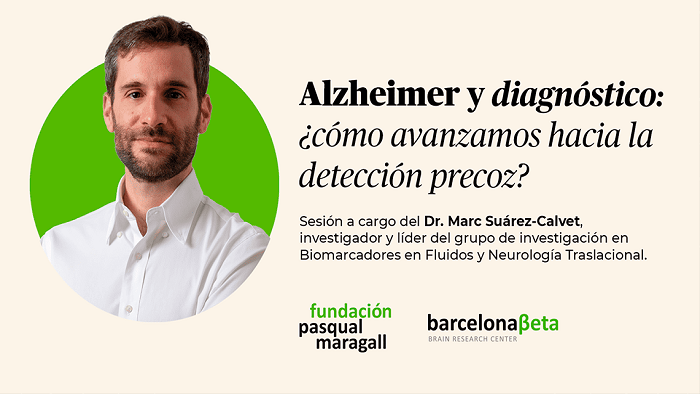22 Nov | 2023
Let's celebrate the Science Week with an IG Live on early detection of Alzheimer's

Every year, during the month of November, the Science Week is celebrated, with the objective of bringing science and technology closer to the public and promoting scientific vocations among the youngest. From the Pasqual Maragall Foundation and its research center, the Barcelonaβeta Brain Research Center (BBRC), we believe in science as the only way to end Alzheimer's disease.
With this purpose, we have participated in the Science Week celebrating an Instagram Live in which Dr. Marc Suárez Calvet, researcher and leader of the Biomarkers in Fluids and Translational Neurology research group at the BBRC, spoke about the current process of diagnosing Alzheimer's disease, its genetic component, and how research is progressing towards early detection.
The researcher began the talk by explaining that, although much progress is currently being made in the early detection of biomarkers, the diagnosis of the disease is still clinical and requires the presence of symptoms of cognitive impairment. Also, he pointed out that Alzheimer's is not due to a single cause in most cases, but to the combination of several risk factors.
As reflected in the survey of "Attitudes and perceptions of the Spanish population on Alzheimer's", prepared by the Foundation this same year, up to 57% of Spaniards think that this disease is transmitted from parents to children. "But this is nothing more than a myth, since hereditary cases are extremely rare, while sporadic Alzheimer's, associated with multiple factors, is much more common", according to the expert.
The researcher followed the talk by explaining the latest advances in the diagnosis of the disease. He pointed out that with his research group they are developing biomarkers to ensure that Alzheimer's can be detected with a blood test. "This test would in no way replace the others, such as the lumbar puncture, but would be complementary, providing other effective tools for the diagnosis of the disease," the researcher said. A test that, together with the control of the risk factors of the disease, could give a new twist in the approach to the disease.
In relation to these determining factors, Dr. Suárez has pointed out that many of them are modifiable, such as those related to cardiovascular risk, so “it is important to work on protective factors, and this can be done by exercising, sleeping well and taking care of the hearing, that way the neurodegenerative diseases can be prevented”.
Dr. Suárez also spoke about the treatment of the disease, exposing the need to develop new drugs, and highlighted that, "even if the mechanisms of the disease are known, it is crucial to adapt this knowledge and transfer it to patients. The objective is to achieve, on the one hand, effective non-pharmacological interventions and, on the other hand, to create new medicines that can modify and slow down, even if to a small extent, the onset of Alzheimer’s".
Finally, Dr. Suárez recalled that "from the Barcelonaβeta Brain Research Center, research center of the Pasqual Maragall Foundation, we carry out continuous research with specialized multidisciplinary teams. This work makes it possible to advance the understanding of the disease and develop innovative strategies for its prevention and treatment”.
You can retrieve the full talk here.









